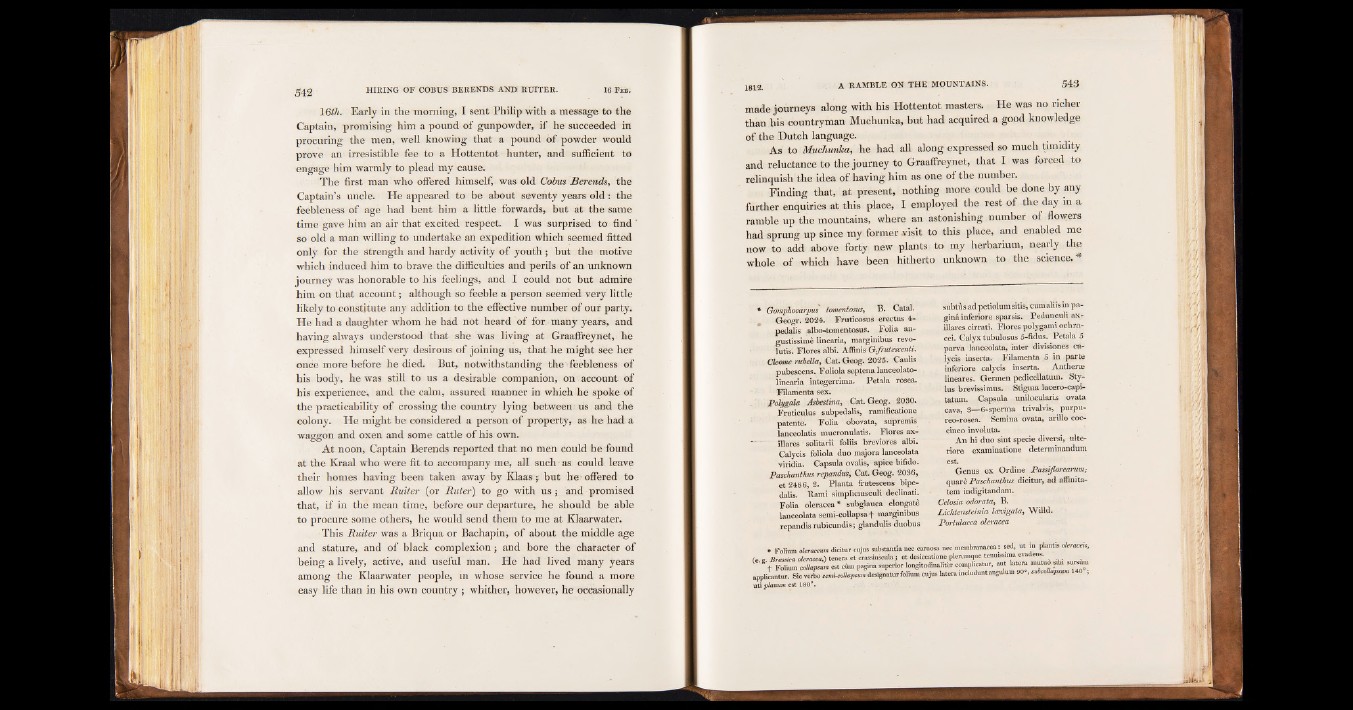
16th. Early in the morning, I sent Philip with a message to the
Captain, promising him a pound of gunpowder, if he succeeded in
procuring the men, well knowing that a pound of powder would
prove an irresistible fee to a Hottentot hunter, and sufficient to
engage him warmly to plead my cause.
The first man who offered himself, was old Cobus Berends, the
Captain’s uncle. He appeared to be about seventy years o ld : the
feebleness of age had bent him a little forwards, but at the same
time gave him an air that excited respect. I was surprised to find ’
so old a man willing to undertake an expedition which seemed fitted
only for the Strength and hardy activity of youth ; but the motive
which induced him to brave the difficulties and perils of an unknown
journey was honorable to his feelings, and I could not but admire
him on that account; although so feeble a person seemed very little
likely to constitute any addition to the effective number of our party.
He had a daughter whom he had not heard of for many years, and
having always understood that she was living at Graaffreynet, he
expressed himself very desirous of joining us, that he might see her
once more before he died. But, notwithstanding the feebleness of
his body, he was still to us a desirable companion, on account of
his experience, and the calm, assured manner in which he spoke of
the practicability of crossing the country lying between us and the
colony. He might be considered a person of property, as he had a
waggon and oxen and some cattle of his own.
At noon, Captain Berends reported that no men could be found
at the Kraal who were fit to accompany me, all such as could leave
their homes having been taken away by Klaasj. but he'offered to
allow his servant Ruiter (or Ruter) to go with u s ; and promised
that, if in the mean time, before our departure, he should be able
to procure some others, he would send them to me at Klaarwater.
This Ruiter was a Briqua or Bachapin, of about the middle age
and stature, and of black complexion; and bore the character of
being a lively, active, and useful man. He had lived many years
among the Klaarwater people, in whose service he found a more
easy life than in his own country j whither, however, he occasionally
made journeys along with his Hottentot masters. He was no richer
than his countryman Muchunka, but had acquired a good knowledge
of the Dutch language.
As to Muchunka, he had all along expressed so much timidity
and reluctance to the journey to Graaffreynet, that I was forced to
relinquish the idea of having him as one of the number.
Finding that, at present, nothing more could be done by any
further enquiries at this place, I employed the rest of the day in a
ramble up the mountains, where an astonishing number of flowers
had sprung up since my former wisit to this place, and enabled me
now to add above forty new plants to my herbarium, nearly the
whole of which have been hitherto unknown to the science.*
* GompJiocarpus tomentosas, B. Catal.
Geogr. 2024. Fruticosus erectus 4-
pedalis albo-tomentosus. Folia angustissime
linearia, marginibús revolutis.
Flores albi. Affinis G .frutescenti.
Cleome rtibella, Cat. Geog« 2025. Caulis
pubescens. Folíola septena lanceolato-
linearia integerrima. Pétala rosea.
Filamento sex.
Polygala Asbestina, Cat. Geog. 2030.
Fruticulus subpedalis, ramificatione
patente. Folia obovata, supremis
lanceolatis mucronulatis. Flores axillares
sdlitorii foliis breviores albi.
Calycis folióla duo majora lanceolata
viridia. Capsula ovalis, apice bifido.
Paschanthus repandiìs, Cat. Geog. 2036,
et 2486, 2. Pianta frutescens bipe-
dalis. Rami simpliciusculi declinati.
Folia olerácea* subglauca elongatè
lanceolato semi-collapsaf marginibus
repandis rubicundis; glandulis duobus
subtùs ad petiolumsitis, cumaliisin pagina
inferiore sparsis. Pedunculi ax-
illares cirrati. Flores polygami eelira-
cei. Calyx tubulosus 5-fidus. Pétala 5
parva lanceolata, inter divisiones calycis
inserta. Filamento 5 in parte
inferiore calycis inserta. Anther*
lineares. Germen pedicellatum. Stylus
brevissimus. Stigma lacero-capi-
tatum. Capsula unilocularis ovata
cava, 3—6-sperma trivalvis, purpu-
reo-rosea. Semina ovata, arillo coccíneo
involute.
An hi duo sint specie diversi, ulteriore
examinatione determinandum
est.
Genus ex Ordine Passiflorearum¡
quarè Paschanthus dicitur, ad affinita-
tem indigitandam.
Ceiosia odorata, B.
Lichtensteinia Icevigaia, Willd.
Portulacca olerácea
» Folium 0Uracema d ic ta r cujuS substantia nec carnosa nec membranacea : sed. u t m pianta ofcraeeii,
fe a Bromea oleacea,) tenera et crassiuscula'; et desiccatione plerumque tenuissima evaden«. |
+ M u m mlUfmm est cùm pagina superior longitudinalitèr complicatur. aut latera “ “ ¡J1
applicanti». Sic verbo rmiaollapiwn designati» folium cnjus latera induduntangulnm 90 , labcoUapmm 140 ¡
uti planum est 180 .